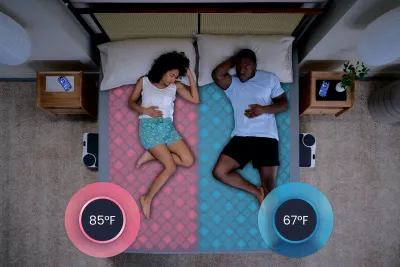Fragmented Sleep: Understanding the Causes and How to Fix It
Chilipad Editorial Team • Dec 19, 2024

Key Takeaways
Fragmented sleep happens when your rest is repeatedly interrupted, preventing your brain and body from reaching the deep stages needed for real recovery.
- Fragmented sleep reduces time spent in deep and REM sleep, leaving you feeling tired, unfocused, and mentally foggy even after a full night in bed.
- Common causes include stress, anxiety, sleep apnea, environmental noise, temperature discomfort, and late night phone use that keeps the brain alert.
- Repeated nighttime awakenings raise cortisol levels, interfere with memory consolidation, and place added strain on immune and cardiovascular health.
- Improving sleep consistency, calming bedtime routines, and creating a cool, quiet bedroom can help reduce nighttime disruptions.
- If frequent awakenings affect daytime energy, mood, or performance, it may signal an underlying sleep issue and is worth discussing with a sleep professional.
We all have unique sleep needs, but most people need around seven hours of sleep each night to maintain their health. Fragmented sleep, however, can prevent us from reaching this goal. Understanding the causes and effects of sleep fragmentation is crucial for developing strategies to improve both sleep quantity and quality.
Sleep disorders, lifestyle choices, and environmental disturbances can cause fragmented sleep. Quality sleep is crucial for maintaining physical health and cognitive functions.
It's estimated that 50 to 70 million Americans are affected by sleep disorders and poor sleep hygiene, which can impede daily activities and negatively impact both health and longevity. [1]
What is Fragmented Sleep
It refers to frequent awakenings during the wake-sleep cycle. These frequent arousals can significantly disrupt the circadian rhythm, leading to poor sleep quality and negative outcomes such as cognitive decline and mood disturbances.
Imagine trying to watch a movie while the screen keeps flickering – interrupted or fragmented sleep is just as disruptive to our rest.
Continuous, uninterrupted sleep is necessary for restorative rest. When sleep is continuously interrupted, it affects the sleep cycle, causing fragmented sleep and preventing us from reaching the deeper stages of sleep that are crucial for physical and mental recovery.
Individuals who frequently experience multiple awakenings throughout the night, with varying timing and duration, often find themselves feeling tired and only partially alert during the day.
Understanding the effects of sleep fragmentation is important for recognizing its impact on individuals' overall health. Allowing ourselves to determine the root causes of fragmented sleep helps us take proactive measures to enhance our quality of sleep.
Say Goodbye to Sleep Fragmentation and Restless Nights
With the Chilipad Dock Pro, you can eliminate sleep fragmentation by customizing your bed’s temperature for uninterrupted, restorative sleep every night.

Common Signs and Symptoms of Fragmented Sleep
Knowing the signs early can help you identify fragmented sleep before it gets worse. One of the main clues is waking up during the night, usually more than once, which cuts down on your total sleep time.
This can leave you feeling tired and groggy during the day—even if you’ve been in bed long enough.
Sleeping Tip: Keep a sleep journal if you notice frequent nighttime awakenings. Tracking this can help pinpoint what’s interrupting your sleep. If you visit a doctor, having it with you can help them determine what’s been causing your sleep issues.
Poor sleep doesn’t just cause tiredness. It can drain your energy, hurt productivity, and affect your overall health. You might also feel more irritable, moody, or anxious.
Your brain takes a hit too: many with fragmented sleep find it harder to focus, make decisions, or solve problems. Recognizing these symptoms in yourself or others can be the first step toward better sleep.
Frequent Causes of Fragmented Sleep
Understanding the main cause is the first step in fixing it. Fragmented sleep can happen for lots of reasons, like sleep disorders, daily habits, or even your environment.
All these factors can disrupt your sleep and prevent you from getting the uninterrupted rest your body craves and ultimately needs.
Next, we’ll take a closer look at how these different causes —whether health-related, lifestyle choices, or environmental factors, can impact your sleep and what you can do about them.
Did You Know: Sleep fragmentation is common among older adults due to natural changes in sleep patterns, leading to reduced time spent in deep sleep. [2]
Sleep Disorders
They are a common cause of sleep fragmentation. Conditions such as obstructive sleep apnea (OSA) cause frequent awakenings due to repeated airway obstructions, often without the individual being aware of these episodes.
Insomnia is another prevalent sleep disorder. It significantly affects sleep quality by causing frequent awakenings and difficulty falling asleep.
Dealing with medical conditions like anxiety or depression can help reduce those annoying sleep interruptions. Periodic limb movement disorder, which causes involuntary leg movements during sleep, also contributes to sleep fragmentation. Treating these underlying disorders can significantly enhance the quality of sleep.
Related Blog: Restless Legs Syndrome; Causes & Management Strategies
Lifestyle Factors
The choices made during the day can disrupt your sleep at night. Irregular sleep schedules, like those faced by shift workers or people with overnight jobs, make it tough to fall asleep and stay asleep, leading to broken, restless nights.
Drinking caffeine sounds like a great option, but for some, drinking late in the day can make it harder to stay in deep sleep.
And then there’s the screen habit many of us have. Ugh! The non-stop scrolling on phones or watching TV right before bed. The blue light from those screens tricks the brain by blocking melatonin, the hormone that tells your body it’s time to sleep.
It’s tempting to keep scrolling or binge-watch in bed, but this habit often leads to tossing and turning throughout the night. Trying to watch your favorite shows earlier in the evening can help you relax and protect your sleep from blue light’s disruptive effects.
When these lifestyle habits add up, they break your sleep into fragments, making it harder to get the good sleep you really need.
Environmental Disturbances
Sometimes the things around you are the reason your sleep gets interrupted—often without you even realizing it. Noise at night can make it hard to fall asleep or cause you to wake up repeatedly.
Too much light in your bedroom, or even sleeping when your body feels too hot, can also break up your sleep and make it tough to get that deep, continuous rest you need.
Creating a dark, quiet, and cool sleep space can help you stay asleep longer and wake up feeling more refreshed.
Related Blog: Understanding the Consequences of Sleep Deprivation
There are ways that can help minimize noise and light to improve your sleep environment. Ideas can include adding blackout curtains and noise machines. Whether it's:
- Pink Noise: A gentle, balanced sound that feels natural and harmonious, helping you relax and improve your sleep quality.
- Brown Noise: A deep, rich, grounding low-frequency sound that can boost focus and encourage relaxation.
- Green Noise: Calming and refreshing, this noise mimics soothing natural sounds to help relax both your mind and body.
- White Noise A consistent, neutral sound that creates a calming backdrop by masking distracting noises.
Health Consequences of Fragmented Sleep
Sleep continuity plays a big role in keeping your brain sharp, affecting things like memory and decision-making. When your sleep gets disrupted too often, it can lead to brain fog, mood swings, and even cognitive decline.
Think about how hard it is to focus or make decisions when your mind feels foggy—that’s the toll fragmented sleep takes on your mental performance.
Physically, chronic sleep fragmentation is associated with an elevated risk of hypertension, diabetes, and obesity. Long-term sleep loss has been strongly linked to depression and anxiety disorders, contributing to emotional health issues.
Diagnosing Fragmented Sleep
Diagnosing fragmented sleep typically requires a combination of medical consultation and sleep studies. Meeting with a sleep medicine physician or your primary doctor is crucial to identifying the issue and uncovering any underlying sleep disorders.
A sleep specialist can offer personalized guidance and develop treatment plans tailored to your unique sleep patterns and health history.
Sleep Tip: If you frequently wake up throughout the night, consider keeping a sleep journal. Additionally, keep track of your meals, as some of your favorite foods might be disrupting your sleep.diagnosing-fragmented-sleep
Medical Consultation
Diagnosing fragmented sleep begins with a medical consultation, where a doctor can evaluate your symptoms and explore potential underlying causes. Discussing snoring or other interruptions with partners can reduce sleep disturbances.
If sleep disturbances continue despite making adjustments, you may want to speak with a sleep specialist or your doctor. They can help diagnose and treat underlying sleep disorders.
Polysomnography
Polysomnography (PSG) is a thorough method for diagnosing sleep disorders, especially sleep fragmentation. During polysomnography, various aspects of sleep are monitored, including brain activity, eye movement, and muscle activity.
Key metrics monitored in polysomnography include airflow to detect breathing issues, as well as the desaturation index, which measures arterial oxygen desaturations per hour of sleep.
The UCL arousal index, calculated from the number of arousals per hour of sleep, also plays a crucial role in diagnosing sleep disturbances and disorders such as disordered breathing.
It can help in the identification of sleep-disordered breathing and other sleep-related conditions. Home sleep apnea tests are also used as a more convenient method for diagnosing sleep apnea, providing quick and accessible results.

Proven Tips for Achieving Uninterrupted Sleep
Getting better, more consistent sleep usually takes more than one simple fix. It usually means improving your sleep habits, addressing any health issues, making lifestyle changes, and finding healthy ways to manage stress.
Each of these steps can make a real difference in how well you sleep and how often your rest gets disrupted.

Chilipad Dock Pro: Cooling Mattress Pad
Getting a good night's sleep often comes down to creating the right bedroom environment, especially if you tend to sleep hot. That's where the Chilipad comes in. The Chilipad Dock Pro is designed with hot sleepers in mind. Circulating water through the mattress pad helps cool your bed and prevents those uncomfortable temperature spikes that can disrupt rest.
Keeping your bedroom cooler supports the body’s natural temperature drop that happens as you wind down, making it easier to fall asleep and stay asleep so you wake up feeling more refreshed.
Want to take your sleep setup even further? We’ve also rounded up some simple tips for designing a bedroom that supports deeper, more restorative rest.
Sleep Hygiene Improvements
These practices can play a crucial role in enhancing sleep quality. Establishing a consistent sleep schedule aids in regulating the body’s internal clock and promoting better sleep. Creating a calming bedtime routine with relaxing activities can ease the transition to sleep and improve overall sleep hygiene.
As discussed previously, reducing your exposure to screens before bedtime can help improve a good night's sleep. This can include adding blackout curtains or sleep masks, too.
Treating Underlying Conditions
Addressing underlying health issues like obstructive sleep apnea can significantly improve sleep and reduce disruptions. Taking steps to improve mental health can also lead to better sleep quality, easing problems like insomnia.
For chronic insomnia, Cognitive Behavioral Therapy for Insomnia (CBT-I) is highly recommended as a first-line treatment, offering long-lasting benefits without relying on medication. Meanwhile, new treatments, such as orexin receptor antagonists, are showing promise as effective options for managing insomnia.
Lifestyle Changes
Improving your sleep doesn’t always require a total overhaul—sometimes it’s the small, everyday choices that make the biggest difference. Take caffeine, for example. That afternoon coffee might help you power through your day, but it can also make it harder to fall asleep at night.
Tip: Cutting off caffeine after lunch is one simple shift that can lead to easier bedtimes and more energized mornings.
Other habits can be just as powerful: going to bed and waking up at the same time each day helps keep your body’s internal clock on track. Adding a relaxing bedtime routine, like reading, meditating, or gentle stretching—signals to your brain that it’s time to wind down. Creating the right sleep environment also matters: keep your bedroom cool, dark, and quiet to set the stage for restful sleep.
On top of that, regular exercise, steering clear of heavy late-night meals, and managing stress through techniques like mindfulness or deep breathing can all work together to help you sleep more deeply and wake up feeling refreshed.
Stress Management Techniques
It's known that managing stress is an important part of getting better sleep. When our stress builds up, it often shows up at night as racing thoughts or frequent wake-ups. Learning how to handle stress during the day can set you up for better sleep.
Some simple but effective techniques include practicing mindfulness meditation, trying deep breathing exercises, or using progressive muscle relaxation to ease tension before bed.
Conclusion
Fragmented sleep can have profound health consequences, affecting everything from cognitive function and mood to physical health. Even one night of disrupted sleep can negatively impact your perception of pain, though it doesn’t influence pain tolerance or inhibition. This underscores the importance of maintaining continuous sleep to ensure overall well-being.
Taking action to address it is essential for maintaining your health and quality of life. Implementing good sleep hygiene practices, treating underlying health issues, and optimizing your environment for sleep can make a significant difference.
Remember, it's ok to ask for help. Improving your sleep is a critical step toward enhancing your overall health.
Common Questions About Fragmented Sleep
What Is Fragmented Sleep?
Fragmented sleep refers to disrupted sleep that’s repeatedly interrupted, preventing you from reaching and maintaining deep, restorative sleep stages.
What Causes Fragmented Sleep?
It can be triggered by stress, sleep disorders, aging, environmental factors like noise or light, or even late-night screen time.
How Can I Fix Fragmented Sleep?
- Stick to a consistent sleep schedule
- Minimize blue light exposure before bed caused by electronic devices
- Optimize your bedroom for comfort and darkness
- Consider a cooling mattress pad like Chilipad for temperature control
- Practice stress-reducing habits like meditation or light stretching
How Does It Affect Your Health?
It disrupts your natural sleep cycles, especially REM and deep sleep, leaving you groggy, moody, and running on fumes the next day. Long-term? It can mess with memory, immunity, and even heart health.
Peer-Reviewed Research References
-
Colten, H. R., & Altevogt, B. M.
Extent and Health Consequences of Chronic Sleep Loss and Sleep Disorders.
National Academies Press, 2019.
Study Type: Consensus Report / Evidence Review
Key Finding: Chronic sleep loss and untreated sleep disorders are associated with increased risk of cardiovascular disease, metabolic dysfunction, cognitive impairment, mood disorders, and reduced overall quality of life.
-
Duffy, J. F., et al.
Age-Related Sleep Disruption and Reduction in the Circadian Rhythm of Urine Output: Contribution to Nocturia?
Current Aging Science, 2015.
Study Type: Clinical Aging & Circadian Rhythm Study
Key Finding: Age-related changes in circadian rhythms and sleep architecture may contribute to nocturia, increasing nighttime awakenings and fragmenting sleep in older adults.
View Study
Source URL: https://www.eurekaselect.com/article/72173









